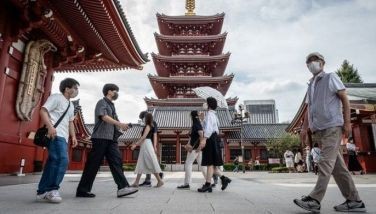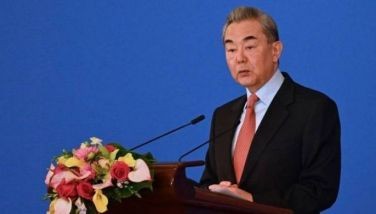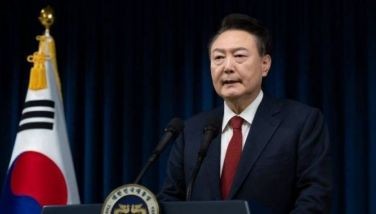Seoul, Tokyo bickering days before 3-way summit with China
October 28, 2015 | 8:23am
SEOUL — Leave it to perpetually squabbling Northeast Asia to spice up that most vanilla of diplomatic activities: the meet-and-greet, photo-op-ridden international summit.
South Korea and Japan finally announced Wednesday what has long been rumored — a three-way leaders' meeting with China this weekend in Seoul — but details are still scarce with just days to go. And the Seoul-Tokyo bilateral meeting, their first formal talks at this level in 3½ years? A brief Monday morning talk, breaking before lunch. It wasn't even on the initial schedule released by Tokyo, though a spokesman later confirmed the meeting.
The lead-up to the summit has seen the South Korean and Japanese foreign ministries publicly dodging questions even as diplomats leaked barbed tidbits to reporters behind the scenes.
The bickering confounds some observers because even though these summits are often devoid of substance, there is high symbolic importance in leaders from these powerful neighbors setting aside their many differences and putting on a good show. China and Japan have the world's No. 2 and 3 biggest economies, respectively. South Korea and Japan are strong U.S. allies and Washington's military and diplomatic bulwark in an unsteady region. All three have a keen interest in containing North Korea's nuclear bomb ambitions.
The problem this week, as is often the case in Northeast Asia, appears to be history, and specifically the inability of Seoul and Tokyo to settle disputes stemming from Japan's brutal colonial rule of Korea in the early 20th century.
Newspapers in Japan reported that the spat centered on Tokyo balking at Seoul's pressure for Japan to make some sort of concession on the issue of Korean women forced into sex slavery by Japan's military leading up to and during World War II. Many in South Korea feel that past Japanese apologies and attempts at recompense have fallen well short. This feeling has been compounded by a widespread view that conservative Japanese Prime Minister Shinzo Abe is whitewashing Japan's wartime atrocities.
South Korea announced that President Park Geun-hye and Abe will meet Monday, a day after they both meet with Chinese Premier Li Keqiang. Seoul has provided few other details but emphasized that the sex slave issue would be on the agenda. Japanese media have reported that Seoul suggested a meeting of just 30 minutes because Tokyo wouldn't cave on the sex slave issue.
South Korean Ambassador to Japan Yoo Heung-soo, in a speech in Tokyo on Monday, urged Abe to make concessions on the issue when he meets with Park.
In response, Japanese Chief Cabinet Secretary Yoshihide Suga told reporters that "Japan's position on the issue has not changed."
Abe also indicated that the issue of sex slaves, called "comfort women" in Japan, would be part of the agenda.
"I hope to discuss frankly what kind of relations we are going to build toward the future," he told reporters Wednesday. "There are a lot of issues that need to be discussed, and I believe there are many things that we can share."
Amid the wrangling, the Japanese point man on Korean affairs, Kimihiro Ishikane, met Tuesday with Lee Sang-duk, the Seoul Foreign Ministry's top official on Northeast Asian affairs, on the sex slave issue.
The summit also represents another step in Beijing's slow resumption of exchanges with Japan following a fissure in relations in 2012 over Tokyo's nationalization of uninhabited East China Sea islands controlled by Japan but claimed by China.
Their rift began to heal last year with a diplomatic settlement and Chinese President Xi Jinping's brief meeting with Abe in Beijing.
China's good relations with Seoul are symbolized by President Park's decision to break ranks with other democratic leaders to attend a lavish military parade in Beijing last month.
Rather than Xi, however, China will be represented in Seoul by less-influential Premier Li Keqiang. Li has a focus on economics, and Beijing says it wants to revive stalled talks on a three-way trade deal between the sides.
"Because we are close neighbors, there are difficult issues," Abe said Wednesday. "I hope to have a meeting where we can open our hearts to each other and frankly exchange views and promote cooperation in a variety of areas."
The meetings could be significant even if the three leaders only manage to build confidence and agree to more summits, said Jeff Kingston, director of Asian studies at Temple University in Japan.
"They can focus on trade issues, security issues, and perhaps leave territorial and historical issues to the side for a moment," he said. "Their relationships are far too important to neglect as they have."
BrandSpace Articles
<
>
Philstar
- Latest
- Trending
Trending
Latest
Trending
Latest
Recommended































